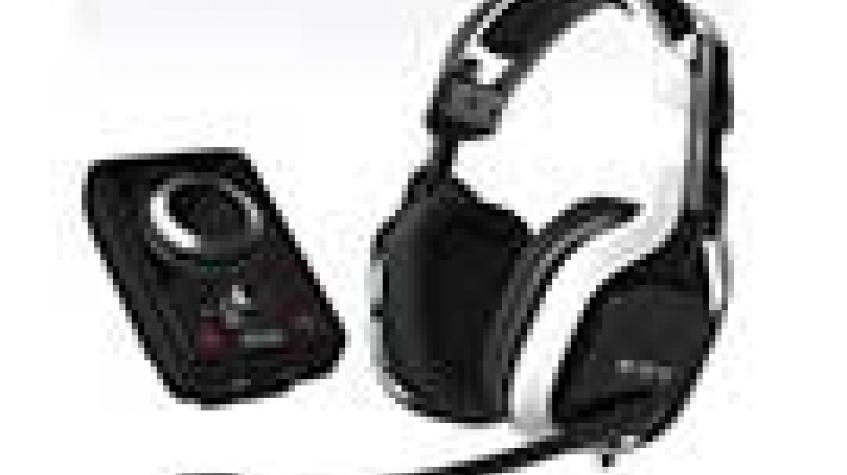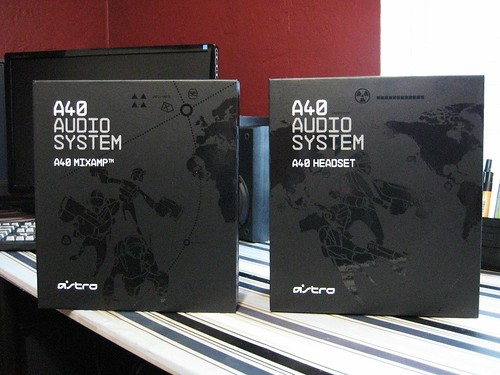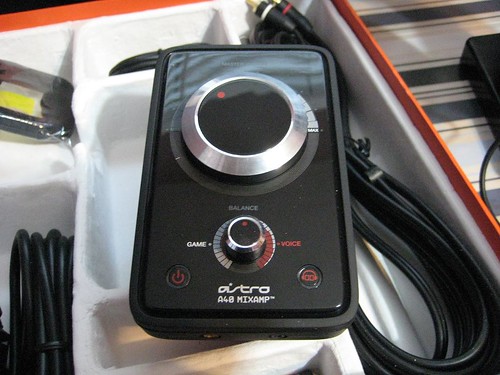
Seven years of competitive gaming (coupled with a compulsive audiophile enthusiasm) has led to many trial-and-error runs with a variety of audio systems. I have spent hundreds of hours and thousands of dollars trying to find the best sound quality. That being said, gaming has expanded my hobby into other realms of audio setups.
After using several headsets from a handful of gaming companies (Tritton, Icemat, Raizer, and others), I ultimately made the switch from gaming to high-end audio headphones.
Needless to say, the recent launch of Astro’s gaming headset – plus MLG’s announcement that Astro A40 will be the official 2008 pro tourney headset – piqued my interest. I checked them out online, read their specs, and noted that they seem to be more or less on par with my current audio headphones, the Sennheiser HD580s ( also at a similar price point to the Astros).
With a little prompting from some fellow 2old2play members, I opted to give them a go. I shelled out the $250 and ordered a pair of A40s complete with MixAmp. Though the price tag may seem expensive to some, it really isn’t much for a quality pair of headphones.
The Delivery
I have to admit that I was very pleased when my Astro headphones were delivered to my front door, all the way from China, in just four short days. Not only was the delivery quick, but the packaging was amazing. Hands down, it was the nicest presentation I’ve ever seen; seriously. The Astros were packaged in two sleek, black boxes; one contained the actual headphones and the second held the mixamp. The boxes included everything I possibly needed to hook up my Xbox (well-written instruction manual, RCA hook ups, plenty of 2.5 and 3.5 mm attachments, etc.) – except for the very necessary optical/toslink connector. I had an extra connector at my disposal so it was not an issue. But it is something to keep in mind if you are considering the purchase.
The first thing I did, after tearing into the shiny black boxes, was to hook the mixamp to my PC so I could try it with some music. My initial reaction: The sound is decent. While the Astros have really good highs and mids, the overall soundstage is lacking. There is a noticeable lack of bass, but the overall clarity is good. I think the Astros rate far better than any other gaming-specific headset I’ve tried to date. You do get what you pay for.
Of course, the Astros aren’t intended for music, they’re specifically designed for gaming. And so I decided to try them out on my game of choice, Halo 3. It’s important to note that FPS games are heavily reliant upon audio cues. If someone is behind you, to your left, or above you, it’s critical that you’re able to react accordingly – most stereo headphones can do that for you. They don’t need to be expensive to work.
My typical setup includes my digital outputs hooked into my receiver/amplifier (Onkyo TXSR573 receiver), plus Sennheiser HD580s. I hooked the mixamp to my 360, via optical, and right away, I was excited and very pleased with just the pre-game chitchat – I could hear my teammates so much better than I could before. With the Astros, in-game voice audio is great. I could hear my teammates, they could hear me. The mixamp offers a dial control for voice volume and a separate control for game volume. I asked my teammates how well they could hear me. (Think: Annoying Verizon guy, “Can you hear me now?”) The feedback was good. My teammate Fire said that he had never heard me so clearly before.
Let the gaming begin.
Once I was dialed in, it was great. Our second game was on a map that has several different levels, above and below. When there was heavy action going on, the sound quality became muddy. Only vaguely could I tell where things were going on. In the past, my Sennheisers have not had this problem; each individual sound came from a distinctly different place.
After three hours of gaming …
I would say the Astros outperformed any other gaming-specific headsets I’ve used. In addition to the total volume control offered by the mixamp, the Astros proved that they can go the distance for long gaming sessions. The velour ear pads remained comfortable. My ears did not sweat. As far as the construction is considered, their quality is a nice bonus. The Astros definitely feel like a piece of high-end electronics, they have the professional feel of DJ headphones. They’re good looking, sturdy, and comfortable. They have stylish removable earplates for easy customization. They also have a nice carrying case for portability. Also, the mic is flexible and it detaches independently from the headset, which makes listening to music not quite as dorky.
And so I decided to mix it up a little with the Astros headphones, sans mixamp, plus Onkyo receiver. The sound quality actually improved. But with this setup, sadly, the Astros became just a decent pair of headphones since they now lacked the benefit of voice volume control – quite possibly the best feature of the headphones.
By day two or three, I had resorted back to my Sennheisers, happy to have the sound quality back, but missing the voice volume control feature. By the end of my four-day trial, with a variety of swapping out and mixing components, my favorite setup has my Sennheisers hooked up through the Astro mixamp. Thanks to the Astros’ compatibility, I’m able t o use a standard PC mic. I again asked Fire how I sounded: Great. Thankfully, I could also hear him very clearly.
Overall the price is acceptable. You do get what you pay for. Holding in my hand some other brands of headphones I would rate Astro’s quality to be superior. The combined price for the Astros and mixamp make it a worthwhile purchase. But I would not recommend the headset or Mixamp individually, together they make a good buy.
|
SPECS |
ASTRO |
SENNHEISER HD580 |
|
Transducer principle |
|
Dynamic, open |
|
Frequency response |
15 - 28,000 Hz |
12-38,000 Hz -10dB/ 16-30,000 Hz -3dB |
|
Nominal impedance |
50 ohm |
300 ohm |
|
Weight w/out cable |
324 g |
260 g |
|
Characteristic SPL |
104dB |
97dB |
|
Ear coupling |
Circumaural |
Circumaural |
|
Headband pressure |
2.6 N |
2.5N |
|
Distortion |
Less than 0.1% |
Less than 0.1% |
|
Connector |
3.5 mm mini-stereo with ¼” adapter |
3.5 mm mini-stereo with ¼” adapter |





